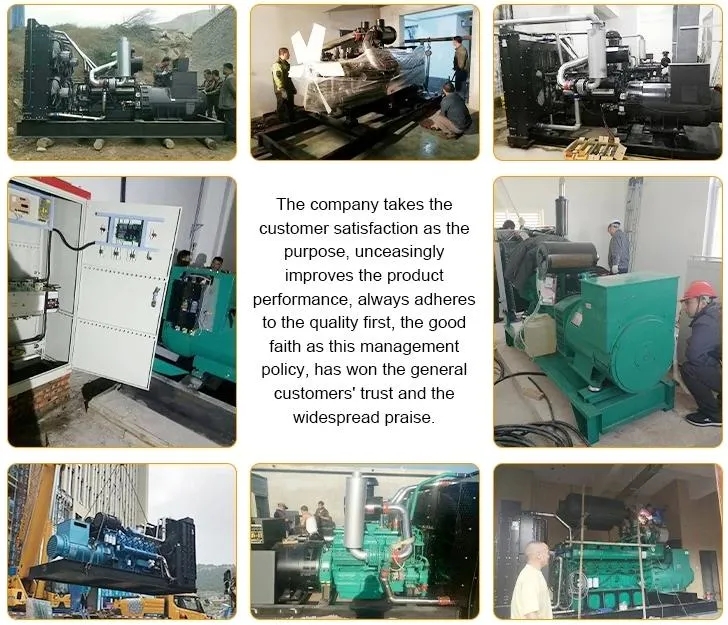Introduction
Diesel generators have been a crucial part of many industries and sectors where a reliable source of power is essential. One of the key challenges faced by operators of diesel generators is managing variable load demands efficiently. In this article, we will explore the importance of diesel generators in meeting variable load demands, the factors that impact their performance under varying loads, and strategies for optimizing their operation in such scenarios.
Importance of Diesel Generators for Variable Load Demands
Diesel generators play a vital role in providing backup power in situations where the grid supply is unreliable or unavailable. They are commonly used in industries such as construction, healthcare, telecommunications, and mining, where a steady power supply is critical for operations. Diesel generators are valued for their robustness, reliability, and ability to handle heavy loads, making them well-suited for applications with variable load demands.
In scenarios where the power demand fluctuates throughout the day or in remote locations where grid connectivity is limited, diesel generators serve as a reliable source of power. They can quickly ramp up or down to meet changing load requirements, providing the flexibility needed to maintain continuous operations.
Factors Affecting Diesel Generator Performance Under Variable Load Demands
Several factors can influence the performance of diesel generators when subjected to variable load demands. Understanding these factors is essential for optimizing the operation of diesel generators in such scenarios.
1. Engine Size and Capacity: The size and capacity of the diesel engine in a generator set determine its power output capabilities. A larger engine with higher capacity can handle greater variations in load demands more effectively. Diesel generators with oversized engines may operate less efficiently at lower loads, leading to increased fuel consumption and emissions.
2. Fuel Consumption and Efficiency: Diesel generators are known for their fuel efficiency, especially at high loads. However, under light or variable load conditions, diesel engines may operate less efficiently, leading to higher fuel consumption and increased maintenance costs. Proper load management and sizing of the generator according to the expected load profile can help optimize fuel efficiency.
3. Engine Response Time: The response time of a diesel engine to load changes is a critical factor in meeting variable load demands. Rapid load changes can impact engine performance, leading to issues such as voltage fluctuations, frequency deviations, and inefficient operation. Diesel generators with faster response times can adjust more quickly to changing loads, ensuring stable power supply.
4. Cooling System Design: The cooling system of a diesel generator plays a crucial role in maintaining optimal engine performance under varying load conditions. Proper cooling is essential to prevent overheating and ensure the longevity of the engine components. Inadequate cooling capacity can lead to engine failures and reduced efficiency, particularly when operating at high loads for extended periods.
5. Generator Control Systems: Modern diesel generators are equipped with advanced control systems that monitor and manage various parameters such as load, fuel consumption, temperature, and voltage. These control systems enable automatic adjustments to optimize generator performance under variable load demands. Proper calibration and programming of the control systems are essential to ensure reliable and efficient operation.
Optimization Strategies for Diesel Generators Under Variable Load Demands
To maximize the performance and efficiency of diesel generators in scenarios with variable load demands, operators can implement several optimization strategies:
1. Load Management: Proper load management is essential for optimizing the operation of diesel generators under variable load conditions. By monitoring the load profile and adjusting the generator output accordingly, operators can minimize fuel consumption, reduce emissions, and prolong the engine's lifespan. Implementing load shedding or load sharing strategies can help balance the load across multiple generator sets for optimal efficiency.
2. Regular Maintenance: Scheduled maintenance is crucial for ensuring the reliable operation of diesel generators under variable load demands. Routine inspections, servicing, and component replacements can prevent unexpected breakdowns and optimize engine performance. Maintenance tasks such as cleaning the air filters, checking fuel quality, and inspecting the cooling system are essential for prolonging the generator's lifespan and maximizing efficiency.
3. Fuel Quality Management: The quality of fuel used in diesel generators can significantly impact their performance and efficiency. Contaminated or degraded fuel can lead to engine issues, reduced power output, and increased maintenance costs. 400kw diesel generator should ensure the use of high-quality diesel fuel and implement proper fuel storage and filtration practices to maintain optimal generator performance.
4. Sizing and Selection: Proper sizing and selection of diesel generators based on the expected load profile are essential for optimizing their performance under variable load demands. Oversized generators may operate inefficiently at low loads, while undersized generators may struggle to meet peak demands. Conducting a thorough load analysis and consulting with experts can help determine the most suitable generator size for the application.
5. Monitoring and Control Systems: Implementing advanced monitoring and control systems can enhance the efficiency and reliability of diesel generators under variable load demands. Real-time monitoring of key parameters such as load, fuel consumption, temperature, and voltage can enable operators to identify potential issues and take corrective actions promptly. Automated control systems can adjust generator settings dynamically to optimize performance and minimize downtime.

Conclusion
Diesel generators play a crucial role in meeting variable load demands in industries and applications where a reliable power supply is essential. By understanding the factors that influence diesel generator performance under varying loads and implementing optimization strategies, operators can maximize efficiency, reduce operational costs, and ensure continuous power supply. Proper load management, regular maintenance, fuel quality management, sizing and selection, and advanced monitoring and control systems are key elements in optimizing diesel generators for variable load demands. With proactive planning and diligent maintenance practices, diesel generators can reliably meet the dynamic power requirements of various applications, contributing to operational efficiency and reliability.
